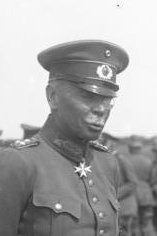Letter to von Kahr (2 November 1923), quoted in F. L. Carsten, The Reichswehr and Politics 1918 to 1933 (Oxford: Clarendon Press, 1966), p. 117.
Hans von Seeckt: Frases em inglês
Letter to General von Massow (31 January 1920), quoted in F. L. Carsten, The Reichswehr and Politics 1918 to 1933 (Oxford: Clarendon Press, 1966), pp. 67-68.
Letter to his sister (4 April 1926), quoted in F. L. Carsten, The Reichswehr and Politics 1918 to 1933 (Oxford: Clarendon Press, 1966), pp. 207-208.
Letter (4 February 1916), quoted in F. L. Carsten, The Reichswehr and Politics 1918 to 1933 (Oxford: Clarendon Press, 1966), p. 105.
Letter to Mrs Seeckt (9 September 1918), quoted in F. L. Carsten, The Reichswehr and Politics 1918 to 1933 (Oxford: Clarendon Press, 1966), pp. 105-106.
Letter to von Winterfedlt-Menkin (19 July 1915), quoted in F. L. Carsten, The Reichswehr and Politics 1918 to 1933 (Oxford: Clarendon Press, 1966), p. 105.
Letter to Mrs Seeckt (12 February 1919), quoted in F. L. Carsten, The Reichswehr and Politics 1918 to 1933 (Oxford: Clarendon Press, 1966), pp. 31-32.
Memorandum (4 February 1920), quoted in F. L. Carsten, The Reichswehr and Politics 1918 to 1933 (Oxford: Clarendon Press, 1966), p. 68.
“We were one in our aim; only our paths were different.”
Seeckt upon meeting Adolf Hitler for the first time (11 March 1923), quoted in John W. Wheeler-Bennett, The Nemesis of Power: The German Army in Politics 1918-1945 (London: Macmillan, 1964), p. 118, n. 1.
